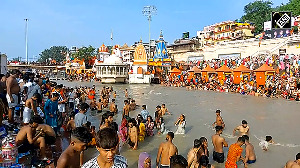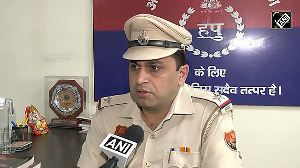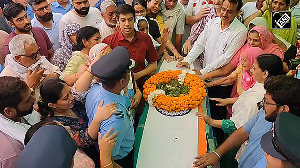Did Anna Hazare's fast achieve anything?
This is the first poser that comes to mind when we see thousands of people in whom he raised hopes rejoicing in the streets. The answer depends upon how we see Anna Hazare's campaign. We can answer the question better after understanding what he did achieve and what he did not. Here is my take.
I have been listening to cliché-ridden sanctimonious speeches of political leaders delivered in a monotonous tone that put me to sleep for nearly four decades now; the latest one of this genre was Dr Manmohan Singh's Independence Day address. This painful exercise coupled with watching corpulent Parliament members walking in and out of Parliament on non-issues with feigned indignation beamed on Lok Sabha TV has turned me quite cynical about our "democratic process". This cynicism had been further reinforced after watching our lawmakers in disorderly conduct on the floor of the House with increasing frequency. In fact, I advise parents not to let their kids to watch our Lok Sabha proceedings lest the young minds consider them as standard parliamentary procedure and perpetuate it.
So it came as a great relief for me during the last three days to see Parliament members seriously discussing issues with the level of urgency they deserved. Of course, in the past they had shown great urgency in dealing with and disposing of issues in one-day flat inside Parliament without all the song and dance about select committee grandstand. But these were issues they considered to be of great importance, like increasing their own emoluments and allowances that left taxpayers like me jealous and fuming.
So it was amazing to see them discuss issues related to corruption, which they had wished away for four decades. I doubt whether the Parliament members would have shown such alacrity if Anna's deteriorating health had not put a gun to their heads. Making Parliament members of all hues face issues that matter is the first achievement of Anna Hazare's fast.
The ability to analyse the core issue from different perspectives demonstrated by some members was impressive. The way some young members like Varun Gandhi, Scindia and Jindal demonstrated their ability to separate the grain from chaff and zero in on the core issue was amazing. I am at a loss to understand why their political parties are not using them to identify and handle issues troubling GenNext.
Second achievement
This is that it has shown that one can achieve results, at least partially, applying Gandhian methods of non-violent struggle on a national scale. It has given a lease of life to the whole philosophy of non-violence for social activism. For most of the post-independence generation, the Mahatma had become a distant memory with relevance only linked to a national holiday. Anna, a frail, aging, non-political social activist, whose articulation was at best simple and basic, has demonstrated that all classes (in our country, I should add castes) of people regardless of their differences could be mobilised to focus on a single agenda without political patronage.
I come from a state where all major political parties woo (bribe if you want to tell the truth) the people with biryani packets, free movie tickets, liquor and 'pocket money' to attend their political rallies in large numbers. So Anna's mobilisation of the masses through informal channels, made up of a motley collection of assorted professionals, retired bureaucrats, aam janata etc (who would never have come together otherwise) was shock therapy to me. To dub this as a middle class movement is sophistry and ignoring the core issue of corruption that galvanised people of all walks to the cause. Surely, the dabbawalas of Mumbai and petty shopkeepers of Delhi, who struck work in solidarity with Anna's call, are not paeans of middle class values.
Third achievement
The 'Anna phenomenon' may or may not survive but it has set a precedent, if not an operational procedure, for other potential Annas with a cause to do it all over. This is a scary scenario for political parties which have taken the people for granted during the last four decades. That was why most of the political parties remained silent initially and some of them closed ranks to talk of how Anna's movement was threatening parliamentary process and the Constitution; some of the media also highlighted these issues. The regional parties resting on the bedrock of casteism and parochialism were reluctant to discuss and talk of corruption as an issue at all.
But the doubting Thomases among the political parties became jittery after the government's traditional methods of browbeating, character assassination through innuendoes, intimidation and arrest (applied successfully in a hundred other situations) failed to stave off the surge of support across the country for Anna. And Rahul Gandhi echoed their sentiments in Parliament rather late in the day when events were already overtaking the validity of this argument (and probably excluded himself from the Congress firefighting group to get out of an increasingly embarrassing situation).
This stark realisation struck the Congress party and Dr Manmohan Singh when they started losing control of the situation rapidly. They had limited options but to act before something happened to Anna, which had the potential to wrest their control of the country. As a result, Anna's movement has put political parties on notice; political parties have to keep their ear to the ground now on.
Can another social activist do a copycat performance of Anna, as the political parties fear? I doubt; for such an act requires a leader who can relate to the aam janata with a cause that can appeal to the whole nation. But who knew earlier that Anna could do such an act and succeed? This uncertainty is sure to dog the political parties from now on and they have to keep in touch with the people. And it is a good thing that the political parties with their cozy setups get shaken up once in a while so that they act in terms of what the common man wants rather than only talk about it.
Anna's insistence on Parliament discussing and recognising the three core issues germane to corruption and governance: citizen's charter for accountability of government; bringing lower bureaucracy under the anti-corruption mechanism; and establishing Lokayuktas in states, has a special place in the whole tale. But for his insistence on this basic minimum condition for breaking his fast, the government would have ignored these issues. They provide a broad framework for evolving a national anti-corruption policy to clean up governance.
Failures
1. The holy cows -- Parliament members and their political parties -- will not be directly affected by Anna's achievement. So political corruption can go on as before; but will they be bold enough to do so, particularly when each one of them is waiting to score a brownie point?
2. What will be the organisation to ensure the government and Parliament live up to their promises? The action committee looks jerry built and too frail to carry on and keep the issues in public focus. It will require a well-knit organisation led in each state by effective leadership to live up to the high expectations kindled by Anna's success.
3. Experienced political leaders showed they can change their act quickly and change their negotiating positions with an agility I have seen only in military manoeuvres; can Anna's team match it when the pressures of Anna's fast is not there as a foil? I have my reservations, although there is a lot of potential in leaders like Kejriwal and Prashant Bhushan.
So did Anna succeed or fail?
It is difficult to say who has won or lost in this clash between the political leadership and social activism. It is like judging Mohammed Ali's bout with the Japanese Sumo champion. Anna's movement was not political; it was social assertion of ordinary people. People rallied to him not because he was trying to score political brownie points like politicians; on some issues many thought he was naive.
Of course, one can argue that he lost because he watered down his demands and zeroed in on the three core issues which he wanted Parliament to accept. However, it is difficult to believe that Team Anna, with all its talent, really believed that they could get Parliament to pass the Jan Lokpal bill before August 30. I think it was a tactical ploy to pitch their demand high and scale it down in negotiations subsequently; probably Team Anna had some internal differences on these tactics. As one who has handled negotiations with extremists, these are standard tactics adopted in any negotiation where both sides want to achieve results rather than carry on the fight.
In this case, the government also tried to buy time by first browbeating and then sticking to its hobby horse of parliamentary supremacy, which was never the issue. They also climbed down when they realised they could not intimidate or crush the groundswell of support Anna had generated. So sensibly, with the help of mediators, they negotiated a more reasonable demand from Anna and his Team that could be pushed through Parliament. So I suppose both sides can claim 'victory' of sorts.
It is silly to compare Anna with the Mahatma; they are from different eras and operated in different settings. But in one respect I am amazed that Anna had been able to achieve what no political party or movement has ever before been able to do -- create a national focus. Even the Mahatma in his time was better equipped; he had a unique charisma and a record of achievements in the struggle for freedom and a large section of Congress workers and cadres who implicitly carried out his orders. But Anna had none of these frills. His background is weighted against him achieving national stature; a retired driver of the army from an unknown corner in Maharashtra who had been ploughing a lone furrow; outside his state people had little interest in his activities. Despite this, think of what he has been able to achieve in his lifetime!
I am a year older than him and when I look back, I am ashamed at what little I had been able to do for society. This is what he has achieved.
What more can you ask for from a man?
Colonel R Hariharan, a retired military intelligence specialist on South Asia, served with the Indian Peace Keeping Force in Sri Lanka as head of intelligence. He is associated with the Chennai Centre for China Studies and the South Asia Analysis Group








